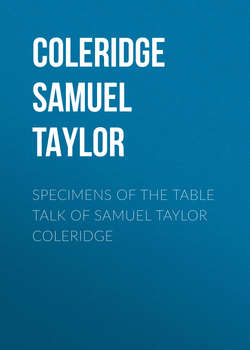Читать книгу Specimens of the Table Talk of Samuel Taylor Coleridge - Coleridge Samuel Taylor - Страница 34
TABLE TALK
April 14, 1830
ОглавлениеCONVERSION OF THE JEWS.—JEWS IN POLAND
There is no hope of converting the Jews in the way and with the spirit unhappily adopted by our church; and, indeed, by all other modern churches. In the first age, the Jewish Christians undoubtedly considered themselves as the seed of Abraham, to whom the promise had been made; and, as such, a superior order. Witness the account of St. Peter's conduct in the Acts36, and the Epistle to the Galatians.37 St. Paul protested against this, so far as it went to make Jewish observances compulsory on Christians who were not of Jewish blood, and so far as it in any way led to bottom the religion on the Mosaic covenant of works; but he never denied the birthright of the chosen seed: on the contrary, he himself evidently believed that the Jews would ultimately be restored; and he says,—If the Gentiles have been so blest by the rejection of the Jews, how much rather shall they be blest by the conversion and restoration of Israel! Why do we expect the Jews to abandon their national customs and distinctions? The Abyssinian church said that they claimed a descent from Abraham; and that, in virtue of such ancestry, they observed circumcision: but declaring withal, that they rejected the covenant of works, and rested on the promise fulfilled in Jesus Christ. In consequence of this appeal, the Abyssinians were permitted to retain their customs.
If Rhenferd's Essays were translated—if the Jews were made acquainted with the real argument—if they were addressed kindly, and were not required to abandon their distinctive customs and national type, but were invited to become Christians as of the seed of Abraham—I believe there would be a Christian synagogue in a year's time. As it is, the Jews of the lower orders are the very lowest of mankind; they have not a principle of honesty in them; to grasp and be getting money for ever is their single and exclusive occupation. A learned Jew once said to me, upon this subject:—"O Sir! make the inhabitants of Hollywell Street and Duke's Place Israelites first, and then we may debate about making them Christians."38
In Poland, the Jews are great landholders, and are the worst of tyrants. They have no kind of sympathy with their labourers and dependants. They never meet them in common worship. Land, in the hand of a large number of Jews, instead of being, what it ought to be, the organ of permanence, would become the organ of rigidity, in a nation; by their intermarriages within their own pale, it would be in fact perpetually entailed. Then, again, if a popular tumult were to take place in Poland, who can doubt that the Jews would be the first objects of murder and spoliation?
36
Chap. xv.
37
Chap. ii.
38
Mr. Coleridge had a very friendly acquaintance with several learned Jews in this country, and he told me that, whenever he had fallen in with a Jew of thorough education and literary habits, he had always found him possessed of a strong natural capacity for metaphysical disquisitions. I may mention here the best known of his Jewish friends, one whom he deeply respected, Hyman Hurwitz.—ED.
